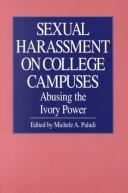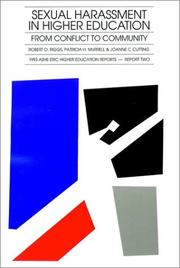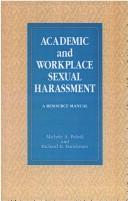| Listing 1 - 10 of 28 | << page >> |
Sort by
|

ISBN: 0585043264 9780585043265 079142801X 0791428028 1438415419 9781438415413 Year: 1996 Publisher: Albany State University of New York Press
Abstract | Keywords | Export | Availability | Bookmark
 Loading...
Loading...Choose an application
- Reference Manager
- EndNote
- RefWorks (Direct export to RefWorks)

ISBN: 1878380230 Year: 1993 Publisher: Washington (D.C.) George Washington university. School of education and human development
Abstract | Keywords | Export | Availability | Bookmark
 Loading...
Loading...Choose an application
- Reference Manager
- EndNote
- RefWorks (Direct export to RefWorks)
Book
ISBN: 9781412954778 Year: 2010 Publisher: London Sage
Abstract | Keywords | Export | Availability | Bookmark
 Loading...
Loading...Choose an application
- Reference Manager
- EndNote
- RefWorks (Direct export to RefWorks)
"Unsafe in the Ivory Tower examines the nature and dimensions of a salient social problem - the sexual victimization of female college students today, and how women respond when they are, in fact, sexually victimized. The authors discuss the research that scholars have conducted to illuminate the origins and extent of this controversial issue, as well as what can be done to prevent it. Students and other interested readers learn about the nature of victimization while simultaneously gaining an understanding of the ways in which criminologists, victimologists, and social scientists conduct research that informs theory and policy debates." "This supplemental text is ideal for courses such as Sex Crimes, Violence and Abuse, Victimology, Gender and Crime, Sociology of Violence, Sociology of Women, and the Sociology of Sex and Gender in departments of criminology, criminal justice, sociology, and women's studies. It is also useful for those involved in studying or creating public policy related to this issue and for those interested in sexual victimization on campuses generally."--BOOK JACKET.
Sexual harassment in universities and colleges --- Women --- Education (Higher)
Book
ISBN: 0822384027 Year: 2002 Publisher: Durham, NC, USA Duke University Press
Abstract | Keywords | Export | Availability | Bookmark
 Loading...
Loading...Choose an application
- Reference Manager
- EndNote
- RefWorks (Direct export to RefWorks)
"Anecdote" and "theory" have diametrically opposed connotations: humorous versus serious, specific versus general, trivial versus overarching, short versus grand. Anecdotal Theory cuts through these oppositions to produce theory with a sense of humor, theorizing which honors the uncanny detail of lived experience. Challenging academic business as usual, renowned literary scholar Jane Gallop argues that all theory is bound up with stories and urges theorists to pay attention to the "trivial," "idian narratives that theory all too often represses.Published during the 1990s, these essays are united through a common methodological engagement—writing that recounts a personal anecdote and then attempts to read that anecdote for the theoretical insights it affords. Gallop addresses many of the major questions of feminist theory, regularly revisiting not only ‘70s feminism, but also poststructuralism and the academy, for, as Gallop explains, the practice of anecdotal theory derives from psychoanalysis, deconstruction, and feminism. Whether addressing issues of pedagogy, the sexual position one occupies when on the academic job-market, bad-girl feminists, or the notion of sisterhood, these essays exemplify theory grappling with its own erotics, theory connected to the real. They are bold, illuminating, and—dare we say—fun.
Book
ISBN: 1483314537 1483349314 Year: 2010 Publisher: Los Angeles : Sage Publications,
Abstract | Keywords | Export | Availability | Bookmark
 Loading...
Loading...Choose an application
- Reference Manager
- EndNote
- RefWorks (Direct export to RefWorks)
"Unsafe in the Ivory Tower examines the nature and dimensions of a salient social problem - the sexual victimization of female college students today, and how women respond when they are, in fact, sexually victimized. The authors discuss the research that scholars have conducted to illuminate the origins and extent of this controversial issue, as well as what can be done to prevent it. Students and other interested readers learn about the nature of victimization while simultaneously gaining an understanding of the ways in which criminologists, victimologists, and social scientists conduct research that informs theory and policy debates." "This supplemental text is ideal for courses such as Sex Crimes, Violence and Abuse, Victimology, Gender and Crime, Sociology of Violence, Sociology of Women, and the Sociology of Sex and Gender in departments of criminology, criminal justice, sociology, and women's studies. It is also useful for those involved in studying or creating public policy related to this issue and for those interested in sexual victimization on campuses generally."--BOOK JACKET.
Book
ISBN: 9781003443018 100344301X 9781000974836 1000974839 9781000980059 1000980057 Year: 2023 Publisher: Abingdon, Oxon New York, NY Routledge
Abstract | Keywords | Export | Availability | Bookmark
 Loading...
Loading...Choose an application
- Reference Manager
- EndNote
- RefWorks (Direct export to RefWorks)
While sexual misconduct on our college and university campuses, both public and private, is dismayingly widespread, it continues to be significantly underreported because most victims perceive that judicial recourse, with its legalistic adversarial approach, fails to address--in a healing way--the harms done to them. Fewer still file formal complaints, many for fear that they may lose agency and that the process may rekindle the trauma of their experience.Recognizing the reality that supermajority of sexual harms in higher education are rarely addressed through established legalistic practices, this book offers a range of alternative approaches based on restorative justice.Starting from the premise What if we started with the goal of healing in mind, this book opens with an overview of common restorative practices and accounts of application and lessons learned by practitioners who have implemented a range of restorative justice and alternative-based approaches. Subsequent chapters cover procedural elements, recommendations around documentation. and interventions for individuals who have caused harm through sexual and gender-based misconduct.The book addresses facilitation; the need to pay attention to self, people, and systems, identities, and power dynamics; the considerations for working restoratively with both complainants and respondents; offers cases and adaptable examples of resolution; and concludes with reflections on institutional implementation from the perspectives of administrators, facilitators, and a student survivor.Recognizing there will always be a need for a formal investigatory approach to cases of sexual misconduct, the book offers a wide range of alternative options that empower those who are most directly affected to make the call for themselves. In doing so, it may increase reporting and, furthermore, in offering a healing justice that addresses individual and community needs, may work to reduce sexual misconduct on campus.

ISBN: 1438415427 0585064156 9780585064154 9780791408292 0791408299 9780791408308 0791408302 Year: 1991 Publisher: Albany : State University of New York Press,
Abstract | Keywords | Export | Availability | Bookmark
 Loading...
Loading...Choose an application
- Reference Manager
- EndNote
- RefWorks (Direct export to RefWorks)
Annotation Provides the results of research and of practical, effective experience in reducing the occurrence of sexual harassment, investigating complaints, and providing counseling and remedies for the victims. In addition, the authors have compiled bibliographies, audio-visual material, and pedagogical techniques for dealing with sexual harassment in the academy and in the workplace. Annotation copyrighted by Book News, Inc., Portland, OR.
Sex discrimination in employment -- United States. --- Sexual harassment in universities and colleges -- United States. --- Sexual harassment of women -- United States. --- Sexual harassment in universities and colleges --- Sex discrimination in employment --- Sexual harassment of women --- E-books
Book
ISBN: 0367483068 9780367483067 Year: 2021 Publisher: Abingdon: Routledge,
Abstract | Keywords | Export | Availability | Bookmark
 Loading...
Loading...Choose an application
- Reference Manager
- EndNote
- RefWorks (Direct export to RefWorks)
"The book looks at rape myths and rape culture within the university environment, examining the development of social identities in the creation and support of such culture. Building on a four-year research project, this book demonstrates how an understanding of rape culture and of the falsity of rape myths amongst students and staff at university is often at odds with an understanding of the degree to which sexual assaults take place, and of why they take place. This book explores how traditionally held beliefs of sex roles between men and women, poor conceptions of consent processes, lack of available data, and an inability to see the full continuum of sexual assault limits the knowledge of sexual assaults inside the university community. Taken together the studies demonstrate how socialized social identities of masculinity and femininity hold power in how consent, sexual assaults, and sexual behaviors manifest through cultural values of rape myths and hook-ups. Universities are challenged to examine their sexual assault programming in connection to Title IX and beyond to create educational opportunities about rape culture and rape myths suitable for their students, faculty, and staff. Written in a clear and direct style, this is essential reading for all those engaged in research about rape culture, sexual assault, and violence against women"
Book
Year: 2016 Publisher: Atlanta, Georgia : Division of Violence Prevention, National Center for Injury Prevention and Control, Centers for Disease Control and Prevention,
Abstract | Keywords | Export | Availability | Bookmark
 Loading...
Loading...Choose an application
- Reference Manager
- EndNote
- RefWorks (Direct export to RefWorks)
Rape in universities and colleges --- Sexual harassment in universities and colleges --- Sex crimes --- Rape --- Sexual harassment --- Prevention.
Book
ISBN: 9789004520950 Year: 2022 Publisher: Leiden ; Boston : Brill,
Abstract | Keywords | Export | Availability | Bookmark
 Loading...
Loading...Choose an application
- Reference Manager
- EndNote
- RefWorks (Direct export to RefWorks)
"What does power abuse look and feel like in the academic world? How does it affect university faculty, students, education and research? What can we do to counteract and prevent power abuse? These questions are addressed in this collection of autobiographical poems, essays and illustrations about academia. The contributors reflect on individual experiences as well as underlying institutional structures, providing original perspectives on bullying, sexual harassment, discrimination, and other forms of power abuse in academic workplaces. They share their stories in order to break the culture of silence around power abuse in academia and point out pathways for constructive change"--
| Listing 1 - 10 of 28 | << page >> |
Sort by
|

 Search
Search Feedback
Feedback About UniCat
About UniCat  Help
Help News
News